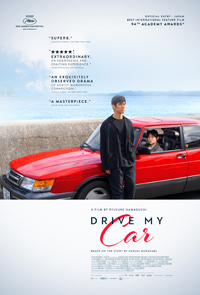Lamprey Love: The Play’s the Thing in Hamaguchi’s Brooding Saga of Regrets
 “When one has no real life, one lives on illusions,” is one of Uncle Vanya’s many defensive regrets in Chekov’s timeless play, the literary undercurrent of the latest masterful offering from Ryusuke Hamaguchi, Drive My Car. Collapsing elements of several short stories from Haruki Murakami’s 2017 collection Men Without Women (but mainly the tale from which the title is derived, merely an essence compared to Hamaguchi’s complexity), it’s as heady a blending of authorial intentions as Lee Changdong’s 2018 Murakami adaptation Burning, which reconstituted the fumes of William Faulkner.
“When one has no real life, one lives on illusions,” is one of Uncle Vanya’s many defensive regrets in Chekov’s timeless play, the literary undercurrent of the latest masterful offering from Ryusuke Hamaguchi, Drive My Car. Collapsing elements of several short stories from Haruki Murakami’s 2017 collection Men Without Women (but mainly the tale from which the title is derived, merely an essence compared to Hamaguchi’s complexity), it’s as heady a blending of authorial intentions as Lee Changdong’s 2018 Murakami adaptation Burning, which reconstituted the fumes of William Faulkner.
The prolific Hamaguchi, who already premiered the excellent vignette triptych Wheel of Fortune and Fantasy earlier this year, unveils his most complex endeavor yet with this tempest of fluctuating roles defined by formidable regrets and the difficulty of communicating.
Celebrated stage actor Yusuke Kafuku (Hidetoshi Nishijima) lives a comfortable life in Tokyo with his wife, Oto (Reika Kirishima), a successful screenwriter. Diverted from a planned trip to Vladivostok, he unwittingly discovers his wife having an affair with a young actor from one of her productions, Koji Takatsuki (Masaki Okada). Unable to confront her about his discovery, Oto suddenly dies one evening just when they’re scheduled to have an important conversation. In the wake of this tragedy, Kafuku finds he can longer perform as Uncle Vanya in a local stage production. Two years pass, and he’s offered the chance at a two month residency in Hiroshima, where he will oversee a local production of Chekov’s play. Assigned to a personal driver, Misaki (Toko Miura) despite his objections, he reluctantly begins to examine his guilt and grief through their sincere interactions.
There’s more Chekov simmering in the background than Louis Malle’s Vanya on 42nd Street (1994), a docu hybrid of a famed NYC staging of Uncle Vanya which the Hiroshima based workshop essentially emulates. Likewise, Murakami’s prose becomes a distant inspiration with Hamaguchi’s creation, formidably expanding upon the short story in several ways. Opening upon a post-coitus creative process from Oto, in which we’re bombarded with the film’s signature loquaciousness, Hamaguchi gives life to Kafuku’s dead wife with elements of “Scheherazade,” also pulling in the metaphor of the ‘noble lamprey,’ creatures which slowly gnaw away at the underbelly of their fishy hosts. Kafuku’s glaucoma from Murakami’s prose takes a literal backseat, as does his lady driver Misaki (and the inherent sexism of his disdain for women drivers), morphing this into a tale of control and the rupture of personality when one is forced to relinquish a semblance of their own agency.
As Kafuku (whose surname is similar to another of Murakami’s favorites influences, Kafka), Hidetoshi Nishikima is handsomely melancholic as the reserved stage actor, who only seems to come to life when he’s in control of a situation. Toko Miura has less room to breathe as his driver, a sort of invisible presence both the audience and Kafuku initially forget is there, observing all. Pristinely shot by Hidetoshi Shinomiya, with a softly creeping score from Eiko Ishibashi, it’s a masterful saga of emotional restraint.
Kafuku’s heady multilingual workshop, which finds a troupe of actors rehearsing alongside one another speaking a mixture of Korean sign language, Mandarin, Japanese and English, beautifully underlines the theme of mis/communication in Drive My Car, and the difficulty in conveying meaning or intention. Like Vanya, who he tries to distance himself from, Kafuku is defined by his regrets concerning Oto, perpetually haunted by his knowledge of her extra marital affair with Takatsuki.
Prior to her cerebral hemorrhage, their method of mixing sexual congress and creativity is similarly interrupted by his emotional languor. As the film finally makes its way to Misaki’s defining trauma, Drive My Car tends to drift into overdrive, insistently intent on juxtaposing her guilt with Kafuku’s. A final sequence taking place in post-pandemic South Korea invites a myriad of interpretations (although Hamaguchi purportedly was forced to trim sequences to fit the mandated running time of the Cannes Film Festival, though the additional sequences would perhaps better orient the finale), but life moves on, illusions fade, perhaps to be replaced by others. And luckily, for those who are unable to resist self-destructive compulsion, life has a way of diverting our energies despite our desires.
Reviewed on July 11th at the 2021 Cannes Film Festival – Main Competition. 179 Mins
★★★½/☆☆☆☆☆


